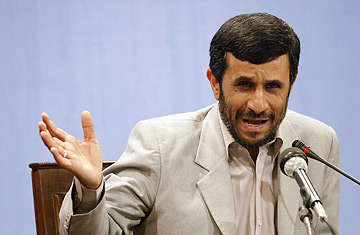
Iran's President Mahmoud Ahmadinejad speaks at a press conference where he announced that Iran would release 15 British sailors and marines it had held captive, April 4, 2007.
Iran claimed it had arrested the Britons for illegally entering Iranian waters, a charge London hotly disputed. Although President Bush declared that Iran had seized the 15 sailors and marines as "hostages," Iran's treatment of its captives from the start indicated that it sought to make a point rather than provoke a war. In contrast to images of blindfolded hostages when Iranians stormed the U.S. embassy in Tehran in 1979, Iranian footage this time showed the British captives in their uniforms sitting together and eating — a diplomatic affront, but hardly a menacing scene.
The capture of the Britons seemed designed to send three messages to London, and more importantly, to Washington:
Iran's sudden decision to release the Britons may mean that the Western pressure on the Iranian regime is bearing fruit. A day after the Britons were taken captive, the U.N. Security Council passed the second set of sanctions against Iran in three months — and a third round of sanctions is anticipated if Iran does not freeze its uranium-enrichment program, which the U.S. fears could enable Tehran to produce a nuclear weapon. As Under Secretary of State R. Nicholas Burns told the Senate last week, "Despite the fulminations of President Ahmadinejad, Iran is not impervious to financial and diplomatic pressure."
But the release of the Britons could also mean that Iran has achieved some of its objectives. The surprise announcement came just a day after the sudden release of an abducted Iranian diplomat in Iraq, who Iranian officials claimed had been arrested on U.S. orders. British, American and Iraqi officials denied any connection between the freed Iranian and release of the Britons. Iran also disclosed on Wednesday that its embassy in Iraq had finally been granted access to the five Iranians detained at Erbil.
The peaceful end to the naval dispute is a victory for diplomacy. Iranian and British leaders maintained constant contact through direct diplomatic channels, and kept their heads amid rising domestic political pressure on both ends to act tough. In particular, the outcome is a significant boost for Iran's pragmatists led by Ali Larijani, head of Iran's Supreme National Security Council, and who is also Tehran's chief nuclear negotiator. Last year, Ahmadinejad's hard-line opposition had helped scuttle a deal Larijani was crafting in discussion with European Union foreign policy chief Javier Solana that involved a temporary suspension of Iran's enrichment program. In announcing the release of the Britons, Ahmadinejad signaled that the more radical faction of Iran's leadership would not stand in the way of Larijani's dealings with the West. The question now is whether Larijani can achieve the same success in guiding Tehran to a compromise in Iran's nuclear showdown — and whether the U.S., following Britain's example, is willing to give diplomacy a real chance.
